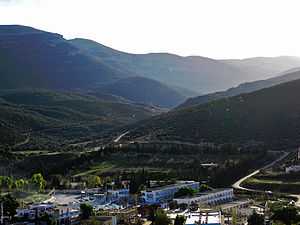Aurès Mountains
| Aurès Range Auras / جبال الأوراس | |
|---|---|
|
Mountain landscape at Hammam Essalihine | |
| Highest point | |
| Peak | Djebel Chélia (Algeria) |
| Elevation | 2,328 m (7,637 ft) |
| Coordinates | 35°19′05″N 6°38′13″E / 35.31806°N 6.63694°ECoordinates: 35°19′05″N 6°38′13″E / 35.31806°N 6.63694°E |
| Geography | |
|
<div style="padding:2px 2px 2px 2px;>  | |
| Countries | Algeria and Tunisia |
| States/Provinces |
List
|
| Parent range | Atlas Mountain System |
The Aurès Mountains, (Berber: Awras, Latin: Aurasium,[1] Arabic: جبال الأوراس) are an eastern prolongation of the Atlas Mountain System that lies to the east of the Saharan Atlas in northeastern Algeria.
The mountain range gives its name to the mountainous natural and historical region of the Aurès.
Geography
Not as tall as the High Atlas Mountains of Morocco, the Aurès mountains are the eastern continuation of the Saharan Atlas. The highest peak, at 2,328 meters (7,637 ft), is the Djebel Chélia in Khenchela Province.
The Belezma Range is a northwestern prolongation of the Aurès Mountains located where the Tell Atlas and the Saharan Atlas come together. Its main summits are 2,178 m (7,145 ft) high Djebel Refaâ and 2,136 m (7,007 ft) high Djebel Tichaou.[2]
History
Historically, the Aurès served as a refuge and bulwark for the Berber tribes, forming a base of resistance against the Romans, Vandals, Byzantine, and Arabs along the centuries.[3]
The mountain area was also a district of French Algeria that existed during and after the Algerian War of Independence from 1954 to 1962. It was in this region that the Algerian War of Independence was started by Berber freedom fighters. The rugged terrain of the Aurès makes it still one of the less developed areas in the Maghreb.
Population
In eastern Algeria the Aurès is a large Berber language speaking region, home of the Chaoui people. The Chaoui eastern Berber population practices traditional transhumance, farming fixed stone terraces in the mountains where they grow sorghum, as well as other grains and vegetables. Seasonally they move their cattle to relatively warm areas in the lowland valleys where they pitch tents or live in other temporary structures and tend livestock through the winter.[4]
Features
 Location of the Aurès region in Algeria. |
View of one of the mountains of the Belezma Range, a western subrange of the Aures. |
 Landscape of southern area of the range. |
See also
References
- ↑ Procopius: Vandalic war (Book 3-4)
- ↑ Belezma National Park - Travel to Algeria
- ↑ Conant, Jonathan (2012). Staying Roman : conquest and identity in Africa and the Mediterranean, 439-700. Cambridge New York: Cambridge University Press. p. 280 -281. ISBN 0521196973.
- ↑ La vie économique du Chaouia de l'Aurès
External links
| Wikimedia Commons has media related to Aurès Mountains. |
- Les Aurès - Algérie (French). Includes many photos of the region.
| ||||||||||||||||||||||
